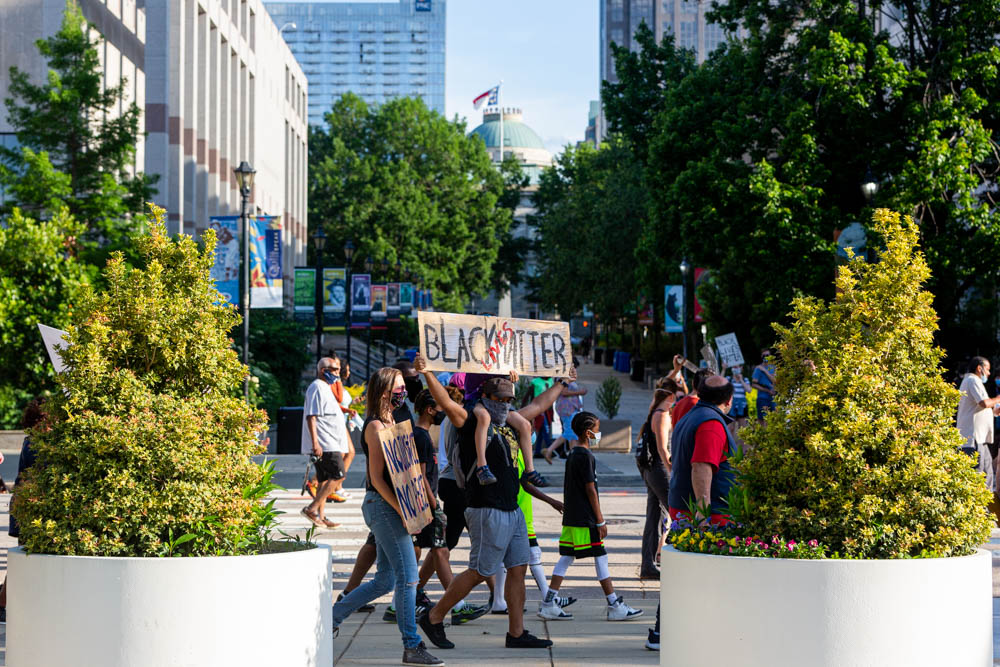Raleigh Community Gathers To Speak Out Against Injustices

On Saturday, May 30, the Raleigh community unified as one to protest against injustices faced by the Black community and gain justice for George Floyd, a recent victim in an officer-involved shooting. The protests started as a peaceful assembly of concerned citizens determined to have their voices heard.
As the protest began at 5 p.m., we heard from two mothers who have experienced the effects of police brutality first hand. Rolanda Byrd, the mother of 2016 officer-involved shooting victim Akiel Denkins, spoke first. She expressed the pain she felt when her son died and the wave of pain that was brought on once again when she heard about the death of George Floyd. She prompted everyone in the crowd to join the Raleigh Police Accountability Taskforce. The group is a coalition of community-based non-profit organizations determined to hold the police in Raleigh accountable for their actions.
Later, we heard from Gloria Mayo, the mother of Keith Dutree Collins. Her son was killed in an officer-involved shooting on Jan.30 of this year. As she spoke, everyone in the crowd felt her pain. Many participants in the crowd began to cry, including myself. She described her son as a kind-hearted person who would not have hurt anyone. Despite his kind-hearted nature, she stated he was shot by the police 11 times while walking home from the store.
Following the two leaders, other community activists spoke, and eventually, one of them announced that the police would be arriving soon. At this point, Gerald Baker, the Wake County Sheriff, took the mike and expressed his reasoning for mobilizing more police. At this moment, you could feel a complete energy shift amongst the crowd. We went from heartfelt and empathetic to enraged. Despite heightened emotions, things remained peaceful as community activists urged to begin marching up Fayetteville street.
As we marched, cars honked in support, and white people watched from their patios and outdoor dining areas as if what we were doing was entertaining. When we reached McDowell street police stood outside of the Wake County Public Safety Center parking deck and blocked the nearby intersection. They halted our march almost as if they were trying to entice us. This is when things took a turn.
Protests began trying to rush the Wake County Public Safety Center and get past police at the intersection. Rocks and water bottles were thrown at both the Wake County Public Safety Center and the police line. This is when tear gas began to be deployed, causing even more rage and emotions to rise. I witnessed a police officer manhandle a Black man (a white woman intervened. Shout out to the allies) which also created unrest amongst us. From my account, things would have remained peaceful, if the police did not block off the intersection.
From there on police continued to deploy flash bangs and tear gas. Eventually, the police line cleared the intersection. At this point, peace was out of the window, we were agitated, we were angry, and we wanted our voices heard.
From then on, I witnessed glass being broken up and down Fayetteville Street. People got into the CVS and largely took supplies that were needed to treat victims of tear gas and other injuries. Others took snacks and threw other items into the street. Some tore down American flags and burned them with lighters and spray paint. Spray paint was also used to tag government buildings. Then the larger fires started. Fireworks were thrown at the wake county courthouse and couches from Kimbrell’s were lit on fire.
Speculations of the presence of white supremacist groups began to rise as white people tore down signs and broke windows as well.
All in all, after the second day of protesting on May 31, I am incredibly proud to say that I am from Raleigh. Officer-involved shootings in this city have happened on several occasions and they have rarely led to convictions for the officer. Many have advocated for an official community-led police accountability force that has yet to be established within the local government. Maybe now we will see change.
In the words of Assata Shakur, “Nobody in the world, nobody in history, has ever gotten their freedom by appealing to the moral sense of the people who were oppressing them.”
- Categories: